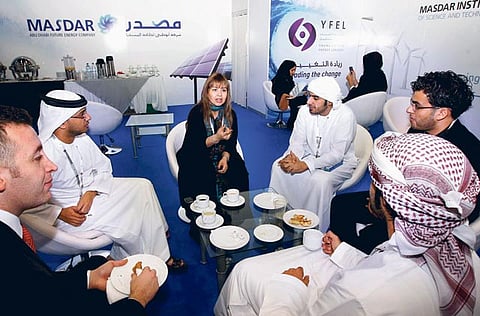New thoughts needed for green future
Prominent leaders in the industry say interested candidates should think outside the box

Abu Dhabi: Dr Marwan Khraisheh, Dean of the Masdar Institute of Science and Technology (MIST), left a well-established university with a steady research centre to dedicate his life to helping future energy leaders with research into alternative energy, environmental technology and sustainability.
The non-profit, private research driven Institute, MIST, started its two-year Masters programme in September 2009, with students arriving from 22 different countries, offering five multidisciplinary areas geared towards the research and development of alternative energy and sustainability.
"We're creating research and innovation infrastructure by attracting the brightest brains from across the world to come here and start their own companies and invest in the UAE. Even though the move wasn't an easy decision, I was excited to help provide well equipped resources and tools for students to ensure a cutting-edge of innovation and critical thinking, with consequences that reach far beyond Masdar, Abu Dhabi and the region," Khraisheh told the Young Future Energy Leaders forum yesterday.
For Alexander O'Cinneide, Head of Venture Investments at Masdar, the renewable energy industry is a challenging business that requires background experience.
Background
"Young people moving into this industry have to have a background in working in a large organisation for a long time or in multiple companies, and understand the dynamics of large projects implemented," he stressed, adding that "our ability to interact with students and talk about what we want to fund, as well as hear their ideas, is exactly what will lead to businesses," O'Cinneide told the audience.
Masdar has recently invested in a young entrepreneur company in the UAE to build a 10-megawatt plant, added O'Cinneide. "That's exactly the kind of entrepreneurs we're looking for, whether it's within the UAE or internationally."
According to Katrina Landis, Group Vice President, BP Alternative Energy, students initially arrive at BP to work in the oil and gas sector and then eventually switch to alternative energy where they chose to become bio-scientists, engineers, project financers and many more.
"I worked in BP for almost 19 years and have previous experience in the oil and gas sector, and can tell you that I've never been more excited in my career than I have been in the two years I spent working in alternative energy. It's a fascinating sector with a lot of challenges involved and an opportunity to start up numerous businesses," said Landis.
Some of the basic leadership qualities required for students interested in working in alternative energy, according to Landis, include basic understanding of businesses that are going to compete with fossil fuels at carbon price; how value is created; what value chains and supply chains look like.
"We look for people who can think out of the box, and come up with ideas on how to use new technology to solve a specific problem. Being perseverant, pushy and coming up with different quick ideas are some of the characteristics our employees in the alternative energy sector share," said Landis.
Bianca Jagger, Chair of the World Future Council, described Masdar as a role model for the rest of the world. "Masdar is a visionary city that many countries across the world are keeping an eye on, and are measuring its level of success or failure; an in my opinion success," she said in her address.
Unless governments across the world decide to invest in renewable energy, "a zero-carbon city is near to impossible. That's why it's so important to have a new role model like Masdar," Jagger said.
Sign up for the Daily Briefing
Get the latest news and updates straight to your inbox



